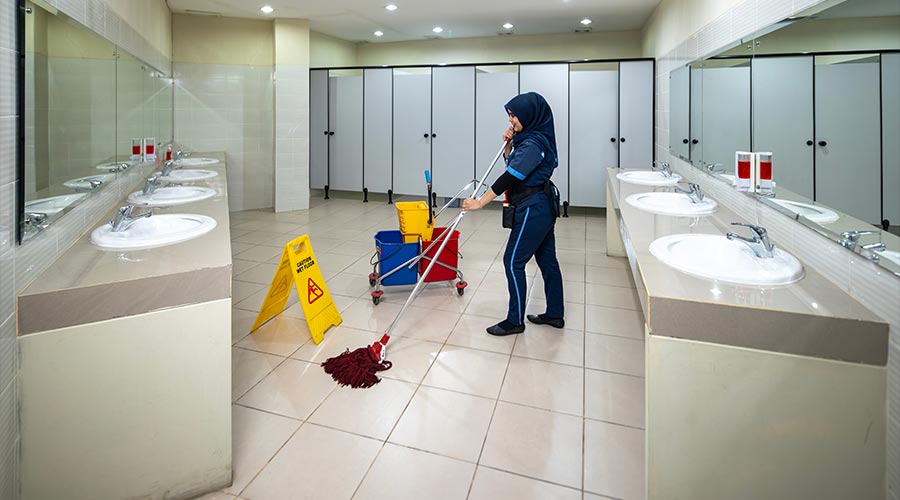
GP PRO, a division of Georgia-Pacific, surveyed 200 maintainers working in U.S. facilities to gain insight into their work habits and mindset. The illuminating findings dispel many long-held misconceptions about maintainers and the work they perform.
Among the survey’s questions was one that asked maintainers what they listen to while working. Nearly half (45 percent) said they tune into podcasts and 15 percent to audiobooks. Surprisingly, nearly a quarter (24 percent) of survey respondents work in silence, and just 17 percent listen to music.
Another question sought to gain consensus on what survey respondents refer to themselves as. While maintainer was chosen by 36 percent of participants, cleaner was chosen by 30 percent, suggesting the debate lingers on. Janitor (23 percent) and custodian (12 percent) rounded out the choices.
In a battle of the sexes, the survey asked participants to identify if men’s or women’s restrooms are messiest. The overall response was a near 50-50 split, with 54 percent choosing men’s restrooms and 47 percent choosing women’s. When segmented by gender, however, 82 percent of men indicted themselves, choosing their own restrooms as being the messiest. Women followed suit with 85 percent choosing women’s restrooms.
“Our goal in conducting this survey was really to help humanize the people who clean and maintain the facilities we all frequent every day, to debunk and dispel some of the misperceptions related the individuals themselves and the work they perform. The survey findings do that,” said Ronnie Phillips, Ph.D., senior director of washroom innovation at GP PRO.
As an example, Phillips noted a long-standing complaint within the cleaning industry of high maintainer turnover and a general lack of maintainer loyalty. “Our survey found quite the opposite to be true,” he said.
In fact, GP PRO’s survey found that 41 percent of respondents have worked in the cleaning industry for more than 10 years. Further, among maintainers between the ages of 25 and 64, nearly all (98 percent) plan to stay in the industry long term, and 57 percent plan to continue in their current role as long as possible. For those between the ages of 25 and 54, more than half (55 percent) see opportunities to advance within the industry.
The survey also found that not only is job tenure high, but so is job satisfaction, with 82 percent of maintainers stating they are somewhat or very satisfied in their current role. Although one-quarter admit the work is messy and dirty and more than two-thirds (67 percent) wish cleaning toilets were faster and easier, only eight percent say the tasks are unenjoyable. More than two-thirds (68 percent) of survey respondents are pleased with the pay, 59 percent appreciate the good healthcare benefits, and more than half (55 percent) credit the flexible schedule for their level of job satisfaction.
Several survey questions sought to better understand how maintainers believe the public perceives and treats. While nearly half (46 percent) of survey respondents said they’ve received public comments conveying appreciation for their work, their attention to detail, and facility cleanliness, 11 percent stated they’ve never received words of appreciation or respect from the public.
Finally, when asked how they perceive themselves in their role, 46 percent of maintainers stated they see themselves as important, appreciated, and relied upon. Still, when asked what they wish the public knew about them, verbatim maintainer responses included, “A simple thank you can make my day so much brighter,” “I am always striving to do my best,” “I bring dedication and commitment to my work every day,” and “I hope people recognize that behind every clean space is someone dedicated to making it happen.”
“The big takeaways from these findings are that maintainers are hardworking, loyal, and motivated professionals who enjoy the work they do and take great pride in it,” Phillips said. “That’s something we can all aspire to.”

 The Down and Dirty on Cleaning in Virus Season
The Down and Dirty on Cleaning in Virus Season How Surfactant Use is Expanding in Commercial Cleaning
How Surfactant Use is Expanding in Commercial Cleaning Maximize Your Margins: Learn How to Automate Pricing and Track Rebates
Maximize Your Margins: Learn How to Automate Pricing and Track Rebates